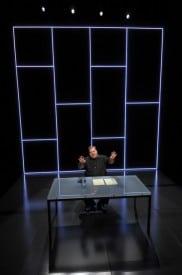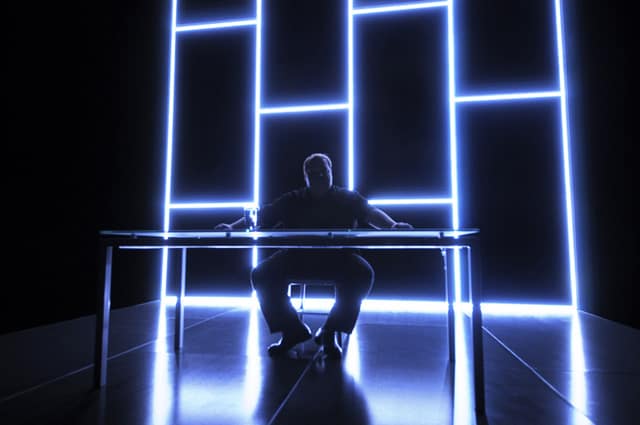Are the iPods, iPads and MacBooks that we cherish and obsess about the blood diamonds of the 21st century? “There’s blood between those keys,” Mike Daiseys tells us near the end of The Agony and the Ecstasy of Steve Jobs, another thought-provoking and eye-opening monologue at Berkeley Repertory Theatre.
We all know the ecstasy. It comes in the form of a Jobs’ keynote with live bloggers broadcasting every nanoscopic detail of Apple’s new shiny, slick, Bauhaus-inspired products. Like lemmings we march en masse to the nearest Apple store so that we can get one step closer to gadget utopia. “I never needed a laptop that could slice a sandwich … I need it!”
But most of us don’t consider the costs; the Agony.
Again employing a first-hand journalistic approach to his research, Daisey travels to the source to get the inside story. In this case: Foxconn. Located in the economic development zone of Shenzhen, China (where downtown “looks like Blade Runner threw up on itself”), the massive factory we’re told supplies 52% of the world’s electronics and employs a staggering 430,000 workers. With a twitchy translator by his side, he visits the mega-compound where he interviews employees, watches factory workers repetitively assemble circuit boards during 14+ hour work days, and learns of suicides. Unions are illegal in China, and soon enough he finds himself talking to young workers: 14 year-olds, then 13… then even 12.
He asks us: “Do you think Apple really doesn’t know?”
In contrast to the oppressive factory conditions, he interweaves the story of the “two Steves” and the history of Apple Computer including all the incredible moments in its colorful history: Woz the Mountain Dew drinking coding genius, Jobs the businessman with penchant for exaggeration and a desire to change the world, the pirate Macintosh team, sugar water Scully and the Newton flop, Xerox PARC and the discovery of a ground-breaking peripheral and new design metaphor, the NEXT acquisition and return of savior Steve Jobs.
The end game is to control the metaphor by which we see the world which in turn leads to control of the world itself. Perhaps far-fetched, but then again consider Apple is now the world’s second most valuable company. Even though it sits in our pockets, that iPhone (or Droid in my case) actually controls us. Bruce Bethke would be pleased; Cyberpunk redux, we are slaves to the information that was supposed to set us free. Apple tells us when to upgrade. Apple tells us what apps to run on it. And the edges of the Internet define the bounds of this new world, where beyond atrocities go unreported and skulk unseen in the dark.
Daisey is an admitted fanboy, having started his obsession with the Apple //c in the 1980s. In those early days he achieved an almost zen like symbiosis with the machine. At times he’s admitted to dabbling with the “heresy” that was Linux and even having flirted with Windows machines — “haven’t we all?” A fascinating bit of trivia about Mike Daisey: he says he takes apart and cleans his MacBook Pro after performances to unwind.

He suggests we need a “humane interface” and can’t divorce ethics from our consumption of these tools. We’re urged to take action and receive a “virus” at the show’s conclusion with specific steps we can take, not just against Apple, but against others too — Nokia, Dell, Samsung, LG, Motorola — that perhaps do business with contractors who employ workers in sub-standard conditions.
The message here, of course, is not unique to the electronics industry. Management of companies that require high volume, low cost manufacturing such as clothing and toys have also reached overseas for cheap labor, and not without controversy.
As a work of entertainment, The Agony and the Ecstasy of Steve Jobs also succeeds, if only slightly less than his last show, The Last Cargo Cult, where we feel somewhat less bloody upon departure. Daisey’s delivery ebbs and flows smoothly over two-hours (with no intermission) taking us alternatively from the big-brother halls of Foxconn to the white, glossy and seemingly innocent consumerist tech culture of America. Sans, I might add, a single PowerPoint slide.
There’s no solution or agenda beyond rising awareness here. Based on conversation after the show in the lobby of the Thrust Stage anecdotally I’d say it was a success. Many were talking about how they’d never look at their iPhone the same way again, or that they didn’t even know human labor was used to manufacture these devices. Later, as we drove home my wife Loni and I debated the issue and discussed the show. For once Loni didn’t fall asleep as we headed down 880. It’s not a new problem — child labor and the possible abuses of a capitalistic society over another part of the world. Loni asked me if it was possible for civilization to advance without destroying something. That it could be a zero-sum game, and all the devices such as “green” this and that were purely manipulations to placate our collective guilt (and to turn profits). And, perhaps, the alternatives for the workers in that plant (and others) are far bleaker.
In light of Steve Jobs’ departure from Apple announced just last week, and the viral like spread of the Wall Street Journal “Tiger Mom” article, these cultural and ethical questions take on even more provocation.
When I arrived home from Berkeley I flipped open my shiny MacBook Pro — a beautiful unibody aluminum design — but did not disassemble it. I stared at it and thought about the factory floors and the piece parts, Daisey’s words echoing, “there’s blood between those keys.”
Loni asked me, “What do you think of your Mac now?”
I’m not sure, I told her.
I felt a little dirty and hypocritical, but not necessarily jailbroken.
The Agony and the Ecstasy of Steve Jobs
Created and Performed by Mike Daisey
Berkeley Repertory Theatre, Thrust Stage
4.5 out of 5 stars
Directed by Jean-Michele Gregory
2 hours, no intermission
Now through February 27, 2011 (in repertory with The Last Cargo Cult)
Noteworthy
- The logos for both The Agony and the Ecstasy of Steve Jobs and The Last Cargo Cult are designed like iPhone apps
- “Remembering that you are going to die is the best way I know to avoid the trap of thinking you have something to lose. You are already naked.” — Steve Jobs
- What Happens Next? “md” on a hand-out given to the audience highlights 4 actions, and asks us to spread the virus: You Can Call Apple Customer Relations at 800-275-2273; You Can Contact Other Electronics Companies (“every major electronics manufacturer uses the same inhumane labor practices in the creation of their products.”); You Can Connect and Educate Yourself; You Can Tell Others
- “I regularly fall asleep with my iPhone in my bed — I have it right before bed and I fall asleep and in the morning I have to find it again.” — Mike Daisey in an interview by Madeleine Oldham in The Berkeley Rep Magazine (p. 17)




